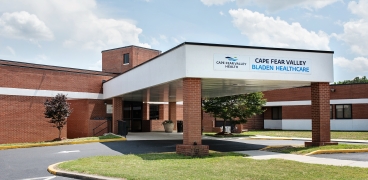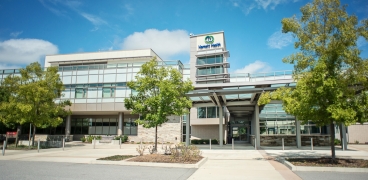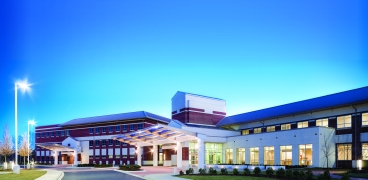Welcome to the Emergency Departments at Cape Fear Valley Health System. We provide unparalleled emergency care, 24/7, ensuring your health is prioritized when it matters most.
Emergency Medicine at Cape Fear Valley Health
Emergency medicine is all about delivering swift and specialized care during critical health situations. Our ERs are designed to serve this mission. Each facility is specifically equipped and staffed to handle the unpredictability and urgency inherent in emergencies.
Annually, we treat hundreds of thousands of patients. CVF Medical Center alone sees over 250,000 patients. This makes it the busiest ER in North Carolina and one of the busiest nationwide.
Beyond numbers and services, our emphasis on specialized care is evident in our certifications. Our facilities are chest pain and stroke certified. This ensures patients experiencing severe cardiovascular or cerebrovascular events receive the most optimal, evidence-based care.
Spread across strategic locations, our ERs ensure you receive expert care when it's most crucial. When emergencies arise, choosing CFVH’s emergency departments means you're in the best hands possible.
Should I go to the Emergency Room?
When deciding between the ER, urgent care or waiting for a doctor's office, consider the severity of your situation. Always head to the ER for life-threatening issues such as:
- Chest pain
- Difficulty breathing
- Severe bleeding
- Potential stroke
These require immediate medical attention.
Urgent care is ideal for non-life-threatening problems that can't wait for a doctor's appointment but aren't severe emergencies. Think of minor injuries, infections or a fever.
If your condition isn't urgent, like routine check-ups or nonsevere symptoms, it's best to wait for a scheduled visit to your doctor's office.
Always prioritize your safety. And if in doubt, get seen by a healthcare provider who can advise you.
What are the signs of a heart attack?
Some common signs of a heart attack:
- Chest pain, pressure or squeezing
- Trouble breathing
- Pain or discomfort in one or both arms, your back, neck or jaw
- Sudden cold sweats with no cause
- Nausea or vomiting
- Heartburn or indigestion
- Feeling lightheaded or like you might pass out
If you or someone you know is experiencing these symptoms, call 911 or go to the ER immediately.
What are the signs of a stroke?
The acronym BE FAST can help you remember the signs of a stroke and what to do:
Balance: Sudden loss of balance or coordination.
Eyes: Sudden trouble seeing out of one or both eyes or double vision.
Face Drooping: One side of the face may droop or feel numb.
Arm Weakness: Sudden weakness or numbness in one or both arms.
Speech Difficulty: Slurred speech or difficulty understanding others.
Time to Call 911: If someone shows any of these symptoms, even if they disappear, call for emergency help immediately.
If you or someone you’re with has these symptoms, it's crucial to seek emergency medical attention right away. Time is of the essence when it comes to stroke treatment.
Our Approach to Emergency Medicine
Emergency medicine at our facilities is more than just rapid response. It's a commitment to patient well-being, from the moment they enter our care to their journey toward recovery.
With multiple emergency departments, we ensure timely, specialized care for every patient, regardless of age or condition.
Our ERs are among the busiest, indicating vast experience in handling a myriad of medical conditions. With certifications in chest pain and stroke treatment, we’re equipped to provide evidence-based care for severe cardiovascular and cerebrovascular events.
Being part of a large hospital system, our ERs have seamless integration with a wide range of specialties. This network ensures that patients are quickly connected to the appropriate specialist for continued care when needed.
Our approach to emergency medicine melds experience, innovation and unwavering commitment to patient welfare. This ensures that in moments of crisis, you're in the best hands possible.
What to Expect at the Emergency Room
Visiting an ER can be a stressful experience, but knowing what to expect can make it a bit easier. Here's a simple guide to your visit at our ERs:
On arrival, you'll be greeted and assessed by our triage team. They'll ask questions to understand the severity of your condition and ensure you get the appropriate care.
We understand that waiting can be stressful, especially when you or a loved one is unwell. However, rest assured that we do everything we can to see patients as quickly as possible.
And remember, even if you're in the waiting room, behind the scenes, we're already starting your care. This might include preliminary tests, screenings and assessments. Our team reassesses patients in the waiting room based on the urgency of their condition.
Our ERs are equipped to handle a range of emergencies. The physicians and staff have specialized training and experience to provide the best possible care.
If your condition requires further expertise, we have a seamless process in place. We coordinate with specialists, whether it's a cardiologist, surgeon or neurologist, to ensure you get the best care.
After treatment, around 70% of our patients are diagnosed, treated and ready to go home. For the remaining who need more care, we coordinate with the in-hospital teams for a seamless transition to promote optimal recovery.
We're proud of our patient-first approach. Every decision, from your initial assessment to the final treatment, is made with your best interest at heart. We hope this gives you a clearer picture of what to expect.






